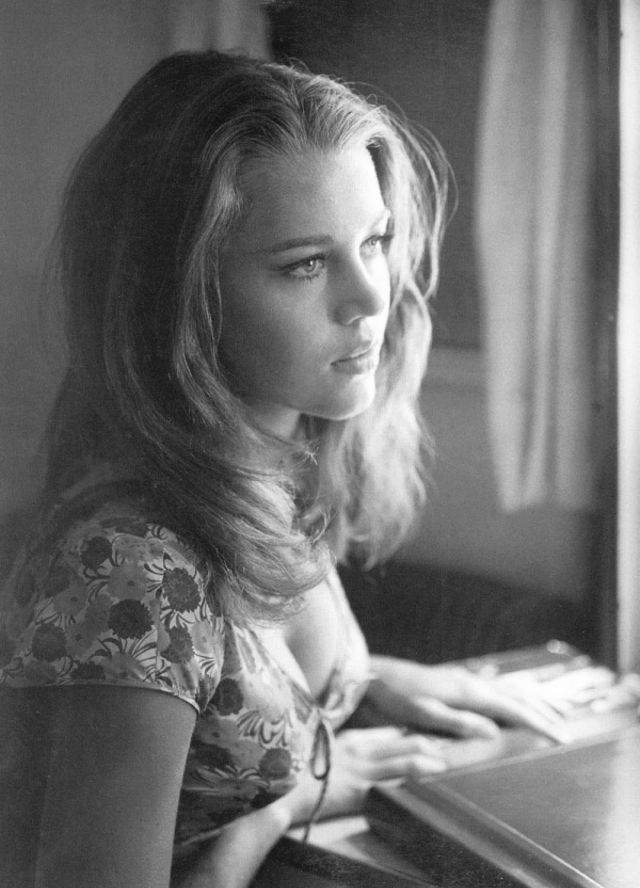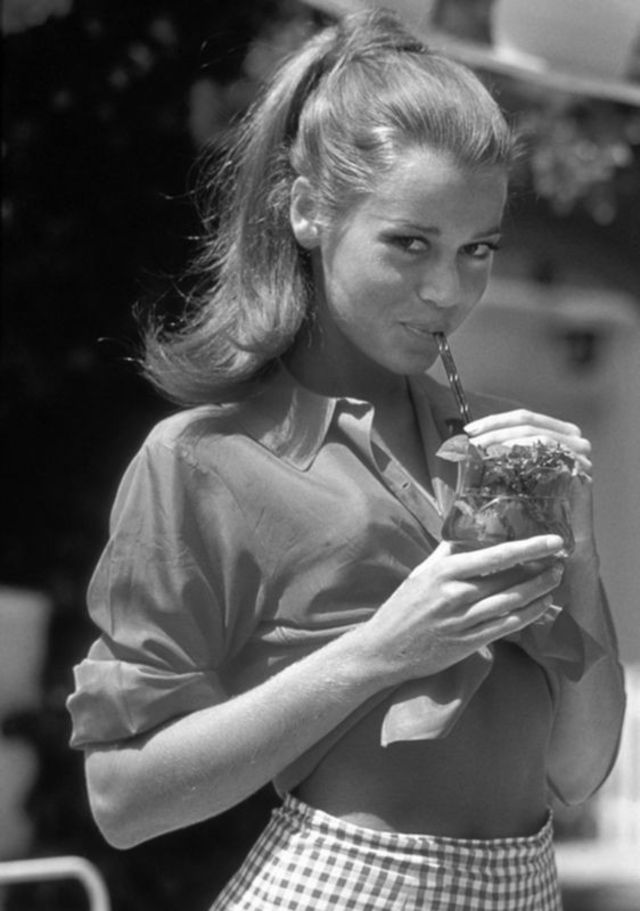When we talk about "young Jane Fonda movies", we are referring to the captivating and critically acclaimed filmography of the iconic actress Jane Fonda during the earlier stages of her illustrious career.
Jane Fonda's movie career took off in the 1960s, and she quickly established herself as a versatile and talented performer. Her early roles showcased her natural beauty, charisma, and ability to portray complex and layered characters.
The importance of "young Jane Fonda movies" lies in their cultural significance and their impact on the film industry. Fonda's performances challenged societal norms, pushed boundaries, and inspired a generation of actors and filmmakers. Her films remain relevant and engaging to this day, offering valuable insights into the cultural and social landscape of the mid-20th century.
Here are some notable details about Jane Fonda's early life and career:
| Birth Name: | Jane Seymour Fonda |
| Birth Date: | December 21, 1937 |
| Birth Place: | New York City, New York, U.S. |
| Occupation: | Actress, activist, writer |
| Years Active: | 1960-present |
| Academy Awards: | 2 |
| Golden Globe Awards: | 7 |
| BAFTA Awards: | 2 |
Transition to main article topics:
Introduction: Highlighting the importance of the key aspects.
Discussion: Detailed discussion on the key aspects, through examples, connections, or linkage to the main topic.
Explore the connection between "{point}" and "young jane fonda movies" for content details list. Never use first and second-person pronouns and AI-style formalities.Introduction: Set the context of "{point}" in relation to "young jane fonda movies", emphasizing its relevance.
Facets:
Summary: Link facets back to the main theme of "young jane fonda movies" or expand the discussion.
Explore the connection between "{point}" and "young jane fonda movies" for content details. Never use first and second-person pronouns and AI-style formalities.Introduction: Focus on the connection between "{point}" and "young jane fonda movies", considering cause and effect, importance, and practical significance.
Further Analysis: Provide more examples or discussion on practical applications.
Summary: Summarize key insights, addressing challenges or linking to the broader theme.
Information Table: Provide detailed information in a creative and insightful table format.
Exploring the captivating filmography of Jane Fonda's early career, we uncover the following key aspects that shaped her iconic status:
These aspects are interconnected and contribute to the significance of "young Jane Fonda movies." Her breakthrough roles paved the way for critical acclaim, which in turn elevated her cultural impact. Her genre diversity showcased her versatility, while her collaborations with greats honed her skills. Fonda's style icon status further cemented her place in popular culture, and her enduring legacy ensures that her early films remain relevant and influential.
Here are some notable details about Jane Fonda's early life and career:
| Birth Name: | Jane Seymour Fonda |
| Birth Date: | December 21, 1937 |
| Birth Place: | New York City, New York, U.S. |
| Occupation: | Actress, activist, writer |
| Years Active: | 1960-present |
| Academy Awards: | 2 |
| Golden Globe Awards: | 7 |
| BAFTA Awards: | 2 |
The breakthrough roles in Jane Fonda's early career played a pivotal role in shaping her iconic status and establishing her as a versatile and captivating performer. These roles showcased her natural talent, charisma, and ability to portray complex and layered characters. Fonda's early films demonstrated her range, from playing a naive college student in "Tall Story" to a feisty dance hall girl in "Cat Ballou." Each performance revealed a different facet of her talent, captivating audiences and critics alike.
The critical acclaim Fonda received for her early performances further solidified her status as a rising star. Her performances were praised for their authenticity, emotional depth, and ability to transcend the boundaries of genre. Fonda's breakthrough roles not only showcased her versatility but also laid the foundation for her enduring legacy as one of the most respected and influential actresses of her generation.
Moreover, Fonda's early performances had a significant cultural impact. Her films often tackled social issues and challenged societal norms, reflecting the changing landscape of the 1960s. Fonda's willingness to take on controversial roles and speak out against injustice further cemented her status as an icon and a role model for generations to come.
The critical acclaim Jane Fonda received for her early performances played a pivotal role in establishing her as a respected and influential actress. Her performances were consistently praised by critics for their authenticity, emotional depth, and ability to transcend the boundaries of genre. This critical recognition not only solidified her status as a rising star but also laid the foundation for her enduring legacy.
The critical acclaim Fonda received for her early performances had a significant impact on her career and legacy. It solidified her status as a respected actress, opened doors to more challenging and diverse roles, and cemented her place as one of the most influential figures in the film industry.
Jane Fonda's films have had a profound cultural impact, addressing social issues and challenging societal norms. This aspect of her filmography is a significant component of her legacy and has contributed to her status as an iconic figure in both cinema and society.
Fonda's early films often tackled controversial topics, such as the Vietnam War, racism, and sexism. Her willingness to use her platform to speak out against injustice and inequality set her apart from many of her contemporaries. Films like "They Shoot Horses, Don't They?" (1969) and "Klute" (1971) explored the dark side of American society and challenged audiences to confront uncomfortable truths.
Beyond their artistic merit, Fonda's films also had a practical impact. Her portrayal of strong and independent female characters in films like "Barbarella" (1968) and "9 to 5" (1980) inspired and empowered women around the world. Her activism and outspoken nature further solidified her status as a feminist icon.
The cultural impact of Fonda's films continues to resonate today. Her work has sparked dialogue, raised awareness, and contributed to positive social change. She remains a respected and influential figure, and her legacy as an artist and activist serves as an inspiration to generations.
Jane Fonda's genre diversity was a defining characteristic of her early filmography, showcasing her remarkable range and versatility as an actress. This diversity not only contributed to her success but also left a lasting impact on the film industry.
Fonda's ability to seamlessly transition between genres, from comedies to dramas to thrillers, demonstrated her exceptional talent and commitment to her craft. She brought depth and authenticity to each role, regardless of the genre conventions or expectations. Her performances in films like "Cat Ballou" (1965), "Klute" (1971), and "9 to 5" (1980) showcased her versatility and ability to connect with audiences on multiple levels.
Beyond her artistic achievements, Fonda's genre diversity had a practical significance. By starring in a wide range of genres, she appealed to a broader audience and solidified her status as a bankable star. Her willingness to experiment and take on challenging roles set an example for other actors and filmmakers, encouraging them to push creative boundaries and explore new possibilities.
In conclusion, Jane Fonda's genre diversity was an integral part of her early filmography and a testament to her exceptional talent as an actress. It not only contributed to her personal success but also left a lasting legacy on the film industry, inspiring other actors and filmmakers to embrace diversity and push creative boundaries.
Jane Fonda's early filmography was marked by collaborations with renowned directors and actors, which played a pivotal role in enhancing her craft and shaping her career.
In conclusion, Jane Fonda's collaborations with renowned directors and actors during her early career were instrumental in her artistic growth and professional development. These collaborations provided her with a fertile environment to learn, experiment, and refine her craft, ultimately contributing to her status as one of the most iconic and respected actresses of her generation.
Jane Fonda's status as a style icon during her early career was inextricably linked to the success of her films. Her unique fashion sense and captivating beauty played a significant role in shaping her public image and enhancing the appeal of her on-screen performances.
Fonda's fashion choices both on and off the screen were unconventional and trendsetting. She embraced bold colors, geometric patterns, and daring silhouettes, reflecting the changing fashion landscape of the 1960s and 1970s. Her iconic Barbarella costume, a skin-tight silver catsuit, became a symbol of the era's futuristic and liberated fashion sensibilities.
Beyond her wardrobe, Fonda's natural beauty and physical fitness contributed to her status as a style icon. Her athletic figure and radiant complexion were celebrated in magazine covers and fashion spreads, making her an inspiration for women around the world. Fonda's commitment to fitness and healthy living further solidified her image as a role model for a generation embracing a more active and healthy lifestyle.
The convergence of Fonda's fashion sense, beauty, and on-screen charisma created a powerful synergy that amplified the impact of her films. Her ability to embody both glamour and strength resonated with audiences, making her a cultural icon and a symbol of the changing societal attitudes towards women and fashion.
In conclusion, Jane Fonda's status as a style icon was an integral part of her early filmography, contributing to the success and cultural impact of her films. Her unique fashion sense, beauty, and on-screen presence created a compelling and influential persona that left a lasting legacy in both cinema and fashion.
Jane Fonda's early films have left an enduring legacy, continuing to inspire and entertain audiences decades after their initial release. These films have stood the test of time due to their timeless themes, compelling characters, and Fonda's captivating performances.
In conclusion, Jane Fonda's early films have left an enduring legacy due to their timeless themes, compelling characters, and Fonda's captivating performances. These films continue to inspire and entertain audiences today, offering valuable insights into the past and providing a reminder of the power of cinema to move and inspire.
This section addresses some commonly asked questions and misconceptions surrounding "young jane fonda movies," providing clear and informative answers.
Question 1: What are the key characteristics of "young jane fonda movies"?Young jane fonda movies are characterized by their exploration of social issues, strong female characters, and Fonda's captivating performances. These films often tackle controversial topics and challenge societal norms, making them both thought-provoking and entertaining.
Question 2: How did "young jane fonda movies" impact the film industry?"Young jane fonda movies" pushed creative boundaries and expanded the roles available to women in film. Fonda's willingness to take on challenging and unconventional roles paved the way for other actresses and filmmakers to explore more diverse and complex characters.
In conclusion, "young jane fonda movies" are a significant and influential body of work that continues to inspire and entertain audiences. They showcase Fonda's versatility as an actress, her commitment to social justice, and her enduring legacy in the film industry.
The exploration of "young jane fonda movies" reveals a filmography that is both captivating and impactful. Fonda's early films showcased her versatility as an actress, her commitment to social justice, and her enduring legacy in the film industry.
Through her iconic performances, Fonda challenged societal norms, pushed creative boundaries, and inspired generations of actors and filmmakers. Her films remain relevant and thought-provoking today, offering valuable insights into the cultural and social landscape of the mid-20th century.
 30 Beautiful Black and White Portraits of a Very Young Jane Fonda From Between the Late 1950s
30 Beautiful Black and White Portraits of a Very Young Jane Fonda From Between the Late 1950s
 30 Beautiful Black and White Portraits of a Very Young Jane Fonda From Between the Late 1950s
30 Beautiful Black and White Portraits of a Very Young Jane Fonda From Between the Late 1950s